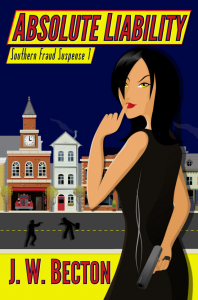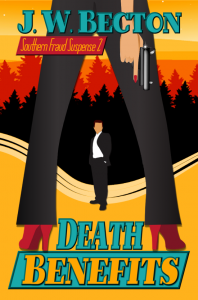Jennifer Becton's Blog, page 41
October 10, 2012
Bad Horse: Observations from Dr. Horrible
Last night, I watched Dr. Horrible’s Sing-along Blog for the first time. I admit it. I came late to the work of Joss Whedon, who wrote, directed, and financed the webisodes. I’m not ashamed. Science fiction and fantasy were not genres my family watched when I was a child; we had one TV in the house and no Tivo. I wasn’t exposed to sci-fi as a youth or drawn to it later (although I did watch X-Files). I attribute it to the masks and other prosthetics worn by the actors. I still have a hard time with them; they make it hard to read facial expressions and, good God, yes, vampires need fangs, but it’s hard to take a lisping bastion of evil seriously.
But I digress.
Firefly was the first fantasy I ever watched and truly loved. No masks or fangs. It totally worked for me. I understood for the first time why people were drawn to such shows. So I began watching the rest of Whedon’s stuff. Currently, I’m on Buffy.
But here’s the thing: I should hate these shows. They are everything I hate to watch: darkness, tragedy, desperation, death of beloved characters, unrelenting ambiguity. I should leave every show feeling beat down and depressed, just like I did after reading Shakespearean tragedies or The Good Earth. Oy vey. I hated that book.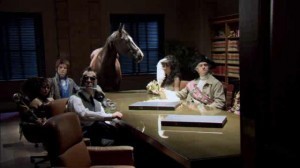
The Evil League of Evil led by Bad Horse.
So why do I like these Whedon shows?
Two words.
Bad Horse.
Let me explain. Dr. Horrible is a musical tragedy that tells the story of a likeable young man and his rise (or fall) to super villainy. His goal is to join the Evil League of Evil, which is run by Bad Horse.
The super villain league is run by a real horse.
It’s ridiculous. And that’s the key. There is a balance of comedy and tragedy, and that’s why it works for me. While reading some heavy literary work or tragedy, I am looking for something I can relate to, someone to cheer for, but if the entire work is a catalog of bad choices and mounting sadness and that is all there is, then by the end of the thing, I want to shoot the hero myself. If a story is only an unrelenting suck downward to death–even if told in beautiful language–then what’s the point? I’m supposed to learn from the hero’s tragic flaw and negative example. Don’t be like this or your life will suck. Well, duh. That’s easy. It’s easy to succumb to your flaws; it’s harder to recognize them and fix them or at least try to. Let’s see an example of that. Tragedy is the easy way out.
But at the same time, tragedy is a part of life and should be addressed. Bad stuff happens, but so do good things. Balance. No story should be wrapped up with a fairytale ending (unless it’s a fairytale). But that doesn’t mean that only one character can be left standing in order to go tell the rest of the world how not to live.
A quote attributed to Joss Whedon sums up the point: “Make it dark, make it grim, make it tough, but then, for the love of God, tell a joke.”
October 8, 2012
The Mistakes of a Night
Have you read She Stoops to Conquer by Oliver Goldsmith? (That’s a link to the free Kindle edition, btw. Go nab it.)
Until this weekend, I hadn’t. I also quite enjoyed this recording of the performance.
Written by Oliver Goldsmith and first performed in 1773, this play is a comedy of manners in which a young gentleman, who is terrified of women of quality, must court one such young lady to please their fathers. A subplot involving an inheritance of jewels, the whimsies of a troublesome step-brother, and more than one case of mistaken identity create a fun tale that depicts both manners tied to the 1770s and enduring themes of love and the quest not only to find it, but to find oneself.
These are the sort of little jewels I love to find: a play that doesn’t take itself so seriously and yet at the same time manages to endure the test of time.
September 21, 2012
Come Chat This Weekend
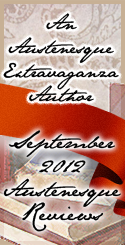 On Sunday, September 23 at 4:00 PM EST, I have the honor of participating in Sociable Sunday at Austenesque Extravaganza hosted by Austenesque Reviews and Meredith Esparza, Angie Kroll, and Jakki Leatherberry.
On Sunday, September 23 at 4:00 PM EST, I have the honor of participating in Sociable Sunday at Austenesque Extravaganza hosted by Austenesque Reviews and Meredith Esparza, Angie Kroll, and Jakki Leatherberry.
Along with authors Marilyn Brant and Karen Cox, I’ll be talking about all things Austen, answering questions, and probably forgetting my characters’ names (because I tend to do that for some reason).
I look forward to seeing you there!
September 20, 2012
Anne Rice: Write What Excites You
I quite like this video by Anne Rice. I don’t agree 100 percent that publishers are looking for truly new voices or stories. With so many trendy, lookalike books out there and based on my own personal experience, I suspect that many publishers are actually looking for new spins on proven genres, books that can easily be labelled, safe books. This makes sense. They want to keep it fresh, but they also do not want to take a huge risk. Doing something truly new or cross-genre is a financial risk for a publisher.
That’s why it’s so nice to have the opportunity to self-publish. You can take the risk yourself and see who is right. And Anne Rice says the same.
Anyway, after watching this video, I have the urge to write something purely for fun. Maybe something in the supernatural realm, which I’ve never seriously considered.
September 19, 2012
On Jane Austen, Buffy the Vampire Slayer, and Brooding Heroes
Yes, I can combine those three topics and make some semblance of sense. I hope.
Ever since I read Wuthering Heights, I have harbored an intense dislike for brooding heroes. I like dark heroes, bad boys, anti-heroes, and the like, but give me a brooding hero and I fall out of love fast. This goes along with my comedy/tragedy philosophy that I’ve blogged about before. I think there’s a general misconception among critics that tragedy is somehow deeper and more meaningful than comedy, and the eternally brooding and inevitably doomed hero is a result of this misconception. If a hero is miserable, than he’s clearly a deeper thinker than the average joe. Because, you know, anyone who thinks deeply about the world must be miserable. Because life sucks and then we die.
There is no transcendence of suffering or raging against the dying of the light. Just embrace your suffering and then die.
Meet Angel. He literally cannot be happy.
I’m a Joss Whedon fan, but I have to admit that I quickly fell out of love with Angel on Buffy the Vampire Slayer. (Spoilers!) As the series moves forward, we learn that Angel has been cursed and will lose his soul if he experiences one moment of true happiness. (And seriously how is this even a good curse? The part where he becomes aware of his crimes and experiences everlasting guilt: that’s a good curse. However, they add the corollary of becoming a monster if he has a moment of joy, but then they neglect to inform him of that tidbit. Wouldn’t it be more of a curse if they told him that any happiness would result in him losing his soul, thus giving him a reason to fear happiness itself?)Moving on: Angel deserved to be punished for his past crimes as a vampire, but what about redemption? What about overcoming the past? Even though Angel helps fight the forces of evil to atone for his wrongdoings, he is apparently never going to overcome his past. He seems to be on a path to wallow in his guilt for all eternity. And I’m supposed to fall in love with him? (I haven’t seen Angel, so I don’t know how his character developed in the spin-off. I’m going on what I know as of season 4 of Buffy.)
Now what about Jane Austen? I’ve read some reviews that call Mr. Darcy a brooding hero, and I couldn’t disagree more. I have never viewed him as brooding in a Heathcliff/Angel sense. Darcy is an aristocratic introvert, and this makes him appear snobbish and rude. But he’s not depicted as sitting a dark room reading bad poetry while lamenting the evilness within. He engages in social activities, takes pleasure in walking or riding, and travels with a close circle of friends, but as Elizabeth points out, he is not well practiced in large-scale socializing or meeting new people. This makes him appear a bit broody, but Darcy isn’t particularly guilt-ridden over his mistakes with Georgiana or terribly morose about the state of the world. Nope, he’s out seeing the world and even partaking in the dreaded country dance.
As for Jane Austen’s opinion on brooding heroes, I flatter myself in believing she agrees with me. When Elizabeth interprets Darcy’s behavior as resentful and predisposed to dislike everything, she mocks him for it. She calls him out on his “unsocial taciturn disposition.” Elizabeth, P&P‘s heroine, herself is not brooding; she takes pleasure in the foibles of humanity and joy in her associations with people and the world in general. Despite her lack of brooding, Elizabeth is clearly the deepest thinker in the novel.
Does this mean she doesn’t suffer? No, she suffers greatly for her mistakes in the Wickham/Lydia fiasco, but she doesn’t marinate in them for the rest of eternity. She overcomes them with the help of Mr. Darcy and her uncle. That is a character I want to read about. She hears her detractions and puts them to mending (Much Ado); she doesn’t engage forever in self-pity. Redemption means more than just making amends and atoning for past wrongs; it means also letting them go and forgiving yourself, which is often the hardest battle for people to face.
I don’t go so far as to say that all characters should be redeemed or that plots should be tied up in a nice little bow, but at the same time, I do not place a high value on suffering for suffering’s sake or believe that deep philosophical thought can only be done in the darkness.
September 4, 2012
Fake Reviews: Oh Joy!
The creation of fake customer reviews. Is anyone really surprised that this happens?
Today, the book world is all in a tizzy because some big name authors–both traditionally published (RJ Ellory) and indie (John Locke)–have either composed glowing reviews for themselves and negative reviews for their competitors or paid to have glowing reviews written for their books. (Among other authors, btw. Those aren’t the only two.)
The fact that authors would do this tells me two things:
1. Reviews are crucial, especially at Amazon. (Real reviews, that is, not fake ones.)
2. Some authors see reviews as a marketing tool, and not as, well, actual customer reviews.
There are a lot of ethical grey areas in book reviews. Who do you ask? Who do you not ask? Do you send free copies to reviewers in exchange for honest reviews? Do you ban your friends from writing reviews of your books?
When authors and publishers send out advanced reader copies, they do choose reviewers who are likely to give a favorable opinion. That makes sense. I wouldn’t send my thrillers to a reviewer who loves clean romance and only clean romance, expecting them to love my books. But giving them a book in exchange for a glowing review is wrong.
This is why reviewers and book bloggers should always clearly state their review policy on their blogs and use an FTC disclaimer on every review for which they received a free copy. Protect yourself and your reviews!
And here are my personal, self-imposed rules for reviewers and reviewing:
I ask family members not to review my books. It just looks funny. This applies even if you cleverly disguise your identity because, as seen in the articles above, that obviously doesn’t work so well.
When sending ARCs for review, I always state plainly that I am looking for an honest review.
I don’t review books. Ever. Even if I am fair and honest in my review of another author’s work, what if they also review my work? That can give the appearance of a quid pro quo situation; I give you a good review, and you give me one. Or it can devolve into a tit-for-tat style retribution situation. I want to avoid that altogether. (Plus, reviewing is not my area of interest.) I will, however, promote my author friends on this blog.
As a writer, I understand the pressure to garner good reviews. We write because we want people to read and enjoy our books, but once the book is published, it is up to readers to weigh in. We did our part already. If we have written a good book and put it through a thorough editorial process, the reviews will come.
August 27, 2012
3 Reasons I Am Hitting Refresh
As I am working on At Fault, I must remain conscious of everything that has happened in Absolute Liability and Death Benefits. The story has to continue and make sense, but so do all the trappings of the series, like titles, subtitles, cover art, and even little things like interior fonts.
A few weeks ago, I began working on the cover of At Fault. Because I’m not a professional, it takes me a long time to get it right. As I began the process, I looked back at the previous two books and realized I wanted to freshen them up.
And here’s the result:
Why?
1. The book’s title should pop, and I felt that the title of Absolute Liability was getting lost a bit. Remember that your title should be legible even at thumbnail size, which is the first view most readers will have of your book online.
2. The Southern Fraud series needed a more cohesive look, something to unify them as a set. Previously, I relied on my bright, high contrast color scheme to attain this. But now, rather than just using a color scheme or font to do this, I am using a shape: skewed boxes around the title (or parts of the title as the case may be).
3. Rebranding: I’ve blogged about my genre identity crisis several times, and I’ve decided to call my series suspense so that I can move the books around the genre lists more easily to find where a crime dramedy will work best.
To celebrate the refreshed covers and to get me in the right mind frame for my own personal refresh (I’m going to the beach, baby! Until then, I’m going to be finishing up the latest draft of At Fault so that my early readers/criticizers can weigh in.), both Absolute Liability and Death Benefits are on sale.
August 21, 2012
A. Yamina Collins Skids in Sideways: Stroke of Confidence

Author A. Yamina Collins runs the popular literary blog Yaminatoday.com. She has been featured on About.com for women in business. The Blueberry Miller Files, a short story collection is her first published book. You can find her book on Amazon, Scribd, Barnes and Noble and Smashwords.
Please welcome A. Yamina Collins, blogger at YaminaToday and author of The Blueberry Miller Files
 , a collection of eclectic short stories now available online. Yamina invited me on her blog last summer, and now I get to host her here! Welcome, Yamina!
, a collection of eclectic short stories now available online. Yamina invited me on her blog last summer, and now I get to host her here! Welcome, Yamina!
Why Publishing Your Short story Is Just the Boost You Need
Ever hear of writers who don’t write? I’m sure you have. You might be one of them. After all, we writers are notorious for standing in our own way of productivity.
Ever wonder why?
Sometimes, this can be due to laziness. But more often I think we stand in our own way out of fear; a fear that we’re just not good enough.
I, for one, was unnerved for years by the feeling that “no publisher will accept me” after receiving 25 rejection letters from publishing houses 12 years ago on a manuscript my agent had submitted for me.
I even lost the will to write for a while.
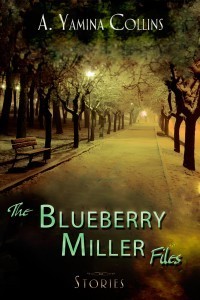
First loves gone wrong. Southern belles. Black anglophiles. And mice that nibble at the face. These are just some of the characters, and the tales, in author A. Yamina Collins’s vibrant new short story collection, The Blueberry Miller Files.
Then self-publishing arrived and I decided to jump into the indie/self-pubbing fray by starting a literary blog, Yaminatoday.com, and legally setting up my own publishing company, DeeBooks Publishing, named after my beloved mother, Dee Collins. The first book I published has been a short story collection called, The Blueberry Miller Files , which debuted in July of 2012.
, which debuted in July of 2012.
Why short stories? The easy answer is that it provided a quick boost to my confidence, giving me the right to declare “I’m a writer!” and mean it. Now I can tell people I’m an author without fear of dreadful follow up questions like, “A writer? Really? Anything published?”
Being published also makes the idea of finishing my new novel less like a fantasy and more like an undeniable reality; more like a job I must complete rather than a task I doubt I’ll finish.
Now, to back up a bit, when I said that publishing gave me “a quick boost” of confidence I don’t mean to imply I that took the lazy, unconcerned route in publishing.
I didn’t.
Indeed, after starting my blog and setting up the publishing company, I then dusted off a number of stories I’d worked hard on years ago, and treated my publishing adventure with as much vigor as I would a novel: I hired a professional editor who’d done editing work with Scholastic books, (Jessie Leaman), hired a professional book cover designer, Rebecca Swift, and asked Guido Henkel to take on the frustrating task of converting my 111 page manuscript into a format that was suitable for publication on such sites as Amazon Barnes and Noble and Smashwords.
Barnes and Noble and Smashwords.
Yes, my efforts have hit me in the pocket book nicely thus far, but I don’t regret it for a minute.
After all, the novel I’m working on will probably take years to complete because I’m such a slow writer. But just because I’m slow doesn’t mean I should lose “fertile publishing time.”
Now, here is the fun part about publishing shorter works: from the time I really got serious about producing The Blueberry Miller Files until the time I actually published the book, a total of 4 months passed.
4 months!
I didn’t have to worry about doing the practical thing either. You see, so far I’ve lost money on this little venture, but the book has only been out for about a month, and in the new digital age of publishing books can be on the “shelf” for years to come – so there’s a huge chance I’ll recoup my money and then some. And even if I don’t recoup the money, I am reminded of what Mark Twain once declared about us writers: “literary persons are flighty, romantic, unpractical, and in business matters do not know enough to come in when it rains or any other time.”
Yes, we writers probably do tend to be flighty, romantic and unpractical, so why not get unpractical with short stories? After all, writers have been “unpractical” with novels for centuries, haven’t they?
As for sales and recouping my money, well, I don’t buy into the hype that short stories don’t sell – I just have to learn ways to market my work more effectively.
After all, remember when F. Scott Fitzgerald was making the majority of his income off stories he sold to the Saturday Evening Post in the 1920s? Who says we can’t return to a time like that?
Yes, it’s true that we live in post-MTV, twitter generation. And, yes, people have the attention span of a fly. But I say, give readers a good short read and they might become some of our biggest fans.
Besides, even if I do sell only a handful of short stories, so what? I’m self-published. I don’t have to worry about my publishing company dropping me. I can indulge my inner artist and produce stories based merely on the notion of art.
And so can you!
So to you budding, would-be and established writers out there, I say give it whirl! Dust off those short ditties and put your best foot forward.
You have absolutely nothing to lose, but all the confidence in the world to gain.
August 14, 2012
Southern Fraud Pre-Launch Announcement Email List

Join the Southern Fraud Pre-release Email List!
Several people have asked me when At Fault will be released, and at the moment, my best answer is: as soon as humanly possible. I am working on it right now. Seriously, the file is open on my desktop! I have even made a start on the cover, and I’m loving the way the text and art are coming together.
Because it’s too early to pin down a launch date–I have to factor in the schedules of my editorial team–the best I can do is offer a pre-release email list. If you want to be the first to know when the next book in the Southern Fraud series will be available, email me. I promise not to send bloated newsletters or spam; I will only send launch announcements.
Thanks for your interest, and I look forward to hearing from you soon!
August 13, 2012
Dramedy: Apparently, It’s a Word

Crime dramedies, a la Castle, are the ideal blend of comedy, drama, and, yes, even romance!
I already adopted the word “ginormous,” so why not add “dramedy” to my vocabulary too? Dictionary.com defines it as a “a television program or series using both serious and comic subjects, usually without relying on conventional plots, laugh tracks, etc.” Webster says, “a comedy (as a film or television show) having dramatic moments.”
First used in 1978, the origin of the word is “blend of comedy and drama,” and in current usage, it applies only to TV and theater. My favorite TV shows are always dramedies, usually crime dramedies, like Castle, The Mentalist, and Keen Eddie. (Here’s a list of other dramedies, if you’re interested.) But I also love other dramedies like Scarecrow and Mrs. King (spy dramedy?), Firefly (space-cowboy dramedy?), and Doc Martin (very grumpy dramedy?).
For me, these shows are the ideal mix of drama, comedy, and even romance. Much as I love the Three Stooges, I don’t want to watch slapstick crime solvers, and much as I enjoy Law and Order, I can only take so much drama. I like the mix of dramedies.
All my life, I’ve been looking for dramedies in book form, only to discover that they’re difficult to uncover. And now I understand why. The genre doesn’t exist, and publishers really seem to prefer books that can be labeled clearly and pigeonholed easily.
There are thrillers, which are supposed to make me want to lock my door against some psycho, evil genius killer, and there are cozy mysteries, which show no violence at all. There’s romantic suspense, which generally features sex and romance equally with suspense elements. Apart from that, there’s the women sleuths, which is kind of a catch all for any subgenre with a female protagonist. But I don’t really want to read or write those. I want a crime dramedy in book form.
So that’s what I try to write in the Southern Fraud series. But there’s a problem. My series doesn’t fit a traditional book genre, other than women sleuths, so how do I adequately communicate to the reader what type of story my (virtual) pages contain? From the beginning, my goal has been to make it clear what my book is, but because of the limitations of genre, it’s been difficult. For a thriller, it’s not dark or scary enough. For a cozy, it’s too dark and scary. For a romantic suspense, there’s not enough sex.
But there IS a market for this type of story, and there is an existing genre label that suits it (albeit in TV land). Crime dramedies are some of the highest rated, best loved shows on TV, so it stands to reason (mine, at least), that people would like to read such stories too. Why does the equivalent genre not exist in the book world?
Southern Fraud is meant to be a crime dramedy series, and because no book genre equivalent exists, I have to borrow from an established, successful TV genre in order to describe it with any degree of accuracy. So that’s what I’m going to call the series from now on. I’m not going to rail against the strictures of the publishing machine here because that would be useless. Genres can help readers find the books they want, but they also create limitations.
And since the release of Absolute Liability in July 2011 and Death Benefits
in July 2011 and Death Benefits
in February 2012, I’ve been trying to figure out the best way to present this series so that readers will know what to expect when they purchase it. I hope relabeling the books as crime dramedies will help.
I mean, if mommy-porn is now a thing, crime dramedy novels should exist!


